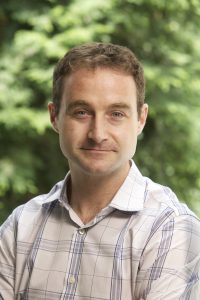
Kevin Hand credits the vast sky of Vermont with sparking his interest in the interplanetary.
“Growing up under the clear night sky, looking out at the stars; who could stare up and not wonder about what’s out there?” Hand said.
Now an award-winning astrobiologist working with organizations like NASA and National Geographic, Hand explores the climates and oceans of other worlds.
He will bring his extraterrestrial expertise to Chautauqua at 10:45 a.m. today, July 11, in the Amphitheater to continue exploring Week Three’s theme: “A Planet in Balance: A Week in Partnership with National Geographic Society.”
As an astrobiologist, Hand explores life throughout the solar system. He studies the climates of various planets and moons, testing their environments for hospitability and the existence of living organisms. Currently, he’s working on NASA’s Europa Clipper mission, which will launch a detailed survey of the moon of Jupiter to explore whether the icy sphere could harbor conditions suitable for life.
Hand said he believes that certain moons like Titan and Europa have “tremendous astrobiological potential,” meaning that alien life might exist relatively close to Earth.
“These moons are covered in ice, but beneath their icy shells, we have reason to predict that vast, potentially global, liquid-water oceans exist today,” Hand said. “If we’ve learned anything from life on Earth, it’s that where you find liquid water, you almost always find life.”
Although Hand’s work keeps his attention focused primarily on outer space, he’s been part of a number of scientific expeditions on Earth as well.
While studying for his doctorate at Stanford University, he was chosen by filmmaker James Cameron to help collect marine biology samples from hydrothermal vents in the Mid-Atlantic Ridge and East Pacific Rise. Hand has also journeyed deep into the Mariana Trench and to Antarctica to study how life survives in the harshest of climates.
During his morning lecture, Hand will share his knowledge about alien oceans and extraterrestrial climates, as well as his experiences learning about life on Earth. Hand said his work in places like the Mariana Trench has given him insight into how life might be possible outside Earth’s atmosphere.
“Not only did we find life thriving at incredible depths, but we also think we uncovered part of what makes that ecosystem possible; part of what makes the biology work down at those depths,” Hand said.
Hand said he believes that learning about exotic planets and moons in the solar system could teach humans a great deal about biological processes on Earth.
“We don’t yet know how life on Earth originated or what makes life and biology possible,” Hand said. “Through our search for life beyond Earth, we aim to learn more about the fundamental phenomenon that is us.”
In addition to learning more about the intricacies of life and evolution by studying what lies among the stars, Hand’s work aims to bolster humanity’s understanding of the ecological phenomena that occur within Earth’s atmosphere.
“Understanding how our home planet works has been greatly informed by studying other planets,” Hand said. “For example, the greenhouse effect was first understood as something that occurred on the planet Venus.”
According to Hand, to achieve the highest level of understanding about Earth — to best protect and preserve it — knowledge from beyond the planet can be just as valuable as knowledge from within it.
He also acknowledged that not everyone has the ability to study heavenly bodies or to analyze extraterrestrial environments in their spare time.
However, he said that curiosity, exploration and adventure are all invaluable things for everyone who calls this planet home, and that everyone has the ability to enjoy and protect it.
“The more people get out and explore, the more people experience the beauty of our home planet, the more we will want to and the more we will work to protect our home,” Hand said. “We live on this tiny little spaceship called planet Earth, and right now we are messing with the hardware of how that spaceship works when we should be protecting it.”




